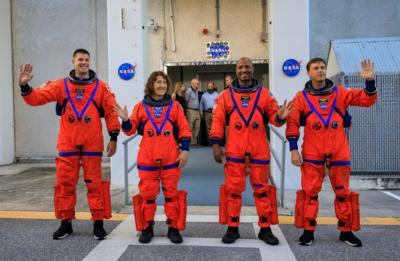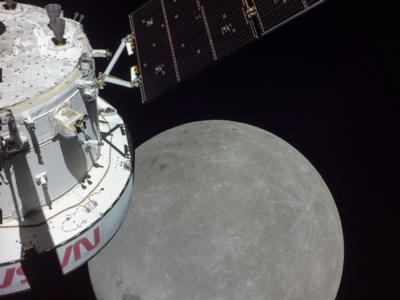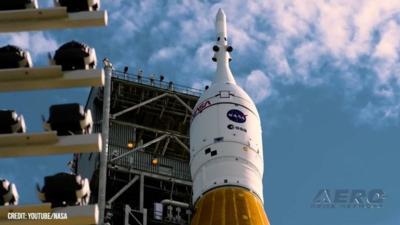NASA Shares 'Progress' Toward Initial Artemis Moon Missions
NASA updated its schedule for its Artemis campaign, glossing over delays that have been introduced to the original schedule.

Claiming that the program will establish the foundation for long-term scientific exploration at the Moon, as well as pull off some politically correct placement of non-white/non-male astronauts on the lunar surface, while supposedly preparing for human expeditions to Mars. NASA posits/excuses itself by noting that 'To safely carry out these missions, agency leaders are adjusting the schedules for Artemis II and Artemis III to allow teams to work through challenges associated with first-time developments, operations, and integration.'
In other words, they're not ready... but then again, NASA is NOT SpaceX.
NASA will now target September 2025 for Artemis II, the first crewed Artemis mission around the Moon, and September 2026 for Artemis III, which is planned to land the first astronauts near the lunar South Pole. Artemis IV, the first mission to the Gateway lunar space station, remains on track for 2028.
“We are returning to the Moon in a way we never have before, and the safety of our astronauts is NASA’s top priority as we prepare for future Artemis missions,” said NASA Administrator Bill Nelson. “We’ve learned a lot since Artemis I, and the success of these early missions relies on our commercial and international partnerships to further our reach and understanding of humanity’s place in our solar system. Artemis represents what we can accomplish as a nation – and as a global coalition. When we set our sights on what is hard, together, we can achieve what is great.”

Ensuring crew safety is the primary driver for the Artemis II schedule changes. As the first Artemis flight test with crew aboard the Orion spacecraft, the mission will test critical environmental control and life support systems required to support astronauts. NASA’s testing to qualify components to keep the crew safe and ensure mission success has uncovered issues that require additional time to resolve. Teams are troubleshooting a battery issue and addressing challenges with a circuitry component responsible for air ventilation and temperature control.
NASA’s investigation into unexpected loss of char layer pieces from the spacecraft’s heat shield during Artemis I is expected to conclude this spring. Teams have taken a methodical approach to understand the issue, including extensive sampling of the heat shield, testing, and review of data from sensors and imagery.
The new timeline for Artemis III aligns with the updated schedule for Artemis II, ensures the agency can incorporate lessons learned from Artemis II into the next mission, and acknowledges development challenges experienced by NASA’s industry partners. As each crewed Artemis mission increases complexity and adds flight tests for new systems, the adjusted schedule will give the providers developing new capabilities – SpaceX for the human landing system and Axiom Space for the next-generation spacesuits – additional time for testing and any refinements ahead of the mission.
“We are letting the hardware talk to us so that crew safety drives our decision-making. We will use the Artemis II flight test, and each flight that follows, to reduce risk for future Moon missions,” said Catherine Koerner, associate administrator, Exploration Systems Development Mission Directorate at NASA Headquarters in Washington. “We are resolving challenges associated with first-time capabilities and operations, and we are closer than ever to establishing sustained exploration of Earth’s nearest neighbor under Artemis.”
In addition to the schedule updates for Artemis II and III, NASA is reviewing the schedule for launching the first integrated elements of Gateway, previously planned for October 2025, to provide additional development time and better align that launch with the Artemis IV mission in 2028.

NASA also shared that it has asked both Artemis human landing system providers – SpaceX and Blue Origin – to begin applying knowledge gained in developing their systems as part of their existing contracts toward future variations to potentially deliver large cargo on later missions.
“Artemis is a long-term exploration campaign to conduct science at the Moon with astronauts and prepare for future human missions to Mars. That means we must get it right as we develop and fly our foundational systems so that we can safely carry out these missions,” said Amit Kshatriya, deputy associate administrator of Exploration Systems Development, and manager of NASA’s Moon to Mars Program Office at headquarters. “Crew safety is and will remain our number one priority.”
NASA leaders emphasized the importance of all partners delivering on time so the agency can maximize the flight objectives with available hardware on a given mission. NASA regularly assesses progress and timelines and as a part of integrated programmatic planning to ensure the agency and its partners can successfully accomplish its Moon to Mars exploration goals.
 NTSB Final Report: Rutan Long-EZ
NTSB Final Report: Rutan Long-EZ ANN FAQ: Turn On Post Notifications
ANN FAQ: Turn On Post Notifications Classic Aero-TV: ICAS Perspectives - Advice for New Air Show Performers
Classic Aero-TV: ICAS Perspectives - Advice for New Air Show Performers ANN's Daily Aero-Linx (06.28.25)
ANN's Daily Aero-Linx (06.28.25) Aero-News: Quote of the Day (06.28.25)
Aero-News: Quote of the Day (06.28.25)





